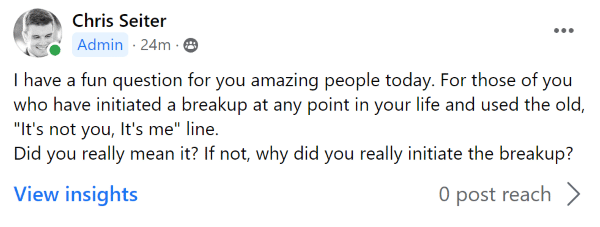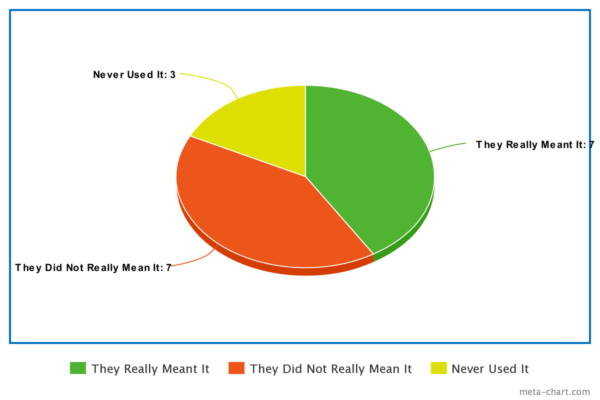Today we’re going to be talking about what your ex really means when they say, “It’s not you, it’s me.” I figured that perhaps the best way to tackle this is by looking at the following factors.
- Figuring Out How Authentic Is The Ex Being When They Say This?
- Understanding The Importance Of Authenticity Triggers
- A Lot Of Times The It’s Not You, It’s Me Excuse Is Disguised
As always, everything that I’m going to dive into here is based on real life experiences from our clients or psychological concepts that have been proven by people a lot smarter than me.
Let’s begin.

What Are Your Chances of Getting Your Ex Boyfriend Back?
Take the quizHow To Figure Out If Your Ex Is Being Authentic When They Say This
I spent the better part of an hour racking my brain on how to approach this article. Often my “go to” when I have a client tell me that their ex said, “it’s not you, it’s me” to them is to point them in the direction of a psychological concept called egoism.
Quoting the god of wisdom, Wikipedia,
Psychological egoism is the view that humans are always motivated by self-interest and selfishness, even in what seem to be acts of altruism. It claims that, when people choose to help others, they do so ultimately because of the personal benefits that they themselves expect to obtain, directly or indirectly, from so doing.
Now, I don’t know about you but I’m not aware of too many situations where humans tend to be more selfish than in their quest to find love. So, if you just go by this that would mean that every single time an ex has ever told you, “It’s not you, it’s me” what they’re really trying to say is that “Its you, not me.”
But something about this simplistic view was bothering me today so I decided to double check my work.
I went to my private Facebook support group and asked the following question,
I have a fun question for you amazing people today. For those of you who have initiated a breakup at any point in your life and used the old, “It’s not you, it’s me” line. Did you really mean it? If not, why did you really initiate the breakup?
I was expecting everyone to back up my thesis around psychological egoism but that’s not what happened.
After I let an hour go by I had 20 detailed responses which roughly fit into three categories.
- 7 People who responded said they really meant it
- 7 People who responded said they did not mean it
- 3 People who responded said they never used it before
This is not at all what I expected. It’s a virtual tie with the people who meant it versus the ones that didn’t mean it.
As it turns out though there was one answer that got me thinking. The one I didn’t count.
I’ve done both. The times that I didn’t mean it (it really was them and not me) was when I didn’t want to hurt their feelings because they really were a good person. This happened when a guy was way more interested in me and was clingy. When I did mean it (it really was me and not them) was when I really wanted to continue but thought it best to step away. I have been blunt with a guy (told him I wasn’t attracted to him and only saw him as a friend) and he didn’t take it well so, it’s a double edged sword.
Essentially what this comment triggered for me was that there is a potential pattern that develops when determining if people “mean it” or “don’t mean it.” I’m going to call these the “authenticity triggers.”
Taking A Look At The Authenticity Triggers
When I looked at what all the people who said they “meant it” had in common three factors revealed themselves to me.
- Length of relationship
- Real life constraints on the relationship
- Recency of the last breakup
Let’s take a quick moment to dive into these three factors starting with the length of relationship.

What Are Your Chances of Getting Your Ex Boyfriend Back?
Take the quizLength of Relationship
Generally speaking I noticed that people tended to mean the “it’s not you, it’s me” statement if they were in a long term relationship with that person. So, if you have two relationships one that has only lasted a month versus one that has lasted it a year the one that lasted a month is most likely to get the inauthentic “it’s not you, it’s me.”
Real Life Constraints On The Relationship
We did have one participant in the poll that mentioned they authentically mentioned it because of long distance factors.
We all like to think that we are the masters of our own fate but sometimes circumstances prevent us from having the ideal relationship scenario. In cases like this authenticity can be found.
Recency of The Last Breakup
This is the rebound factor. Now, if you’re not familiar with my research on rebounds I highly recommend you watch this video,
What I like a lot about this factor is that it pairs extremely well with the first factor and gives us a potential answer to the length of relationship question above. First things first though, our research has indicated that the average rebound relationship will last anywhere between 3-6 months. I think the exact number is 5.2 months.
So, here’s the thing. If your ex broke up with his ex and immediately moved on to you only to break up with you in between that 3-6 month range AND gives you the it’s not me, it’s you it’s more than likely they’re being inauthentic and are still hung up on their ex.
Additionally, circling back around to that first factor if you’ve been with your ex for longer than 6 months and they gave you the excuse then they might potentially mean it.
The Disguised “It’s Not You, It’s Me “
Yesterday I was writing an article on understanding the avoidant factors of love and I referenced a breakup text one of our clients got in it.
In fact, it’s that exact breakup text that gave me the idea for this article.
What I find really interesting about this text is that it’s one of the best disguised, “it’s not you, it’s me” excuses I’ve seen. The avid reader will simply look at the complex nature of the relationship and miss it but it’s there if you look hard enough.
Specifically the part where the ex boyfriend says,
I know there’s something broken in me (I’ve probably brought baggage/problems from my previous relationship) and until I’ve fixed it on my own I can’t be in a relationship.
Notice how he phrases everything in the first person here.
- I’ve
- I
- My
In fact, in the entire message there’s only 4 mentions of “you” based terms while there are 19 “I, me, I’ve” based terms. I’m pointing this out because a lot of times people gloss past the breakup explanation their ex gives and don’t even realize they’re literally being told, “It’s not you, it’s me.”
Exes are really good at disguising it now-a-days and the benefit is huge if you can pull it out. They can remain “the good guy” in your eyes. They can show that they care about you while ripping your heart out.
So, here’s what I’d like to do. I’d like to use the tools I provided above, the authenticity triggers, to come up with an answer on how authentic that text above actually is.

What Are Your Chances of Getting Your Ex Boyfriend Back?
Take the quizIt’s a tricky one because in my mind it checks off two competing authenticity triggers.
- Length of relationship
- Real life constraints on the relationship
- Recency of the last breakup
Do you see how difficult determining authenticity is?
On the one hand there are quite a few references to an ex that he mentions which indicates both a recency issue and a constraint issue.
“Not being able to get over an ex” is definitely something that is a constraint on a relationship but that same constraint informs that the relationship could potentially be a rebound.
In this case I actually think the ex is being authentic due to the fact that he’s referencing the simple fact he’s still hung up on his ex. Of course, it’s not always that simple and a lot of exes won’t even give you that much to go through.
Additionally a lot of breakups happen in person and human memory isn’t the greatest when it comes to recall. Nevertheless, the authenticity factors can help you understand what’s really going on in your exes head, especially if they are hitting you with the “It’s not you, it’s me” excuse.




